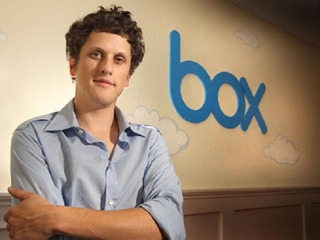Parkinson's monitoring app h2o gets FDA approval to add haptic cueing feature
Foggy uses the Taptic Engine in Apple Watch to provide vibrotactile stimulation for gait freezing
Read more...
You couldn’t pay me to trade places with Marissa Mayer right now. Naturally, that’s why she’s the CEO of Yahoo and I’m not (so I don’t think anyone would pay me to trade places with Mayer). But the major drawback to all of the glass-ceiling shattering that she’s doing these days is that every decision she makes is put under the political microscope. Why didn’t she take a longer maternity leave? Who is raising her baby? Is the baby just running around bringing lattes to everyone?!
Many a feather was ruffled two weeks ago when Yahoo cracked down on telecommuting workers. Naturally, the decision was largely framed in the context of Marissa Mayer being unfair to women. As a new mother herself, she knows how difficult it can be to juggle a newborn with work, so why is she trying to make life harder on her fellow moms?
The matter was made worse by the fact that Mayer reportedly started construction on a private, personal nursery right next to her office, which—not surprising at all—outraged workers (which means there is presumably no on-site daycare at Yahoo).
The discussion is largely being framed in terms of what’s better for Yahoo as a company. It’s lagging behind the competition, and Mayer is right to want her employees to have face-time to get ideas rolling. But is she doing it the right way? Pissing off your employees does not a good business plan make, especially in Silicon Valley, where competition for top engineering talent is so stiff that Apple, Google, HP, and others actually made a deal a while back that they would stop trying to steal each other’s employees.
Yahoo offers its employees a few nice perks, like a free gym access, but what employees want is better work/life balance. So what are some other Silicon Valley startups doing to ease the strain on their employees with families?
As you might imagine, there are very few startups in Silicon Valley are headed by parents with young children. There are even fewer headed by mothers with babies, but one that stands out as an outlier is Babbaco. With mother-of-three Jessica Kim at the helm, the subscription commerce company is run by the very person it’s targeting: parents. For $19-$40 a month, users can get a box of age-appropriate educational toys, books, and activities delivered to their doorstep.
Kim co-founded the company when she was pregnant with her first child—now six years old—and raised money when she was pregnant with her third—now eight months old. For the first several months after her youngest was born, Kim brought him into the office and recalled breastfeeding him freely and openly in front of her 12-person team (under her Hooter Hider), and even while recruiting new hires.
While Kim has set a very open and public pro-breastfeeding/pumping precedent at Babbaco, she says there are other ways the company is making life easier on employees.
“We have a very results-oriented culture, so I'm okay with people being flexible in how, when, and where they get their job done,” said Kim.
For example: “Customer care has a lot of email requests that need to be answered. If there are childcare issues that arise, our customer care manager works from home and answers those emails when it best fits her schedule that day.”
Babbaco also allows employees to bring their kids to work when the schools have a holiday off. Kim says they simply set the kids up with projects and art supplies. “They actually help us do some kid testing while they are here.”
Headed by power-couple Kevin and Julia Hartz, Eventbrite consists of 220 employees who have pushed the company to new milestones, including over $1 billion in cumulative ticket sales. The Hartzes also have two daughters—a preschooler and a toddler. Like Jessica Kim of Babbaco, the Hartzes had their first not long after founding Eventbrite in 2006, which has since gone on to raise $78 million in financing.
So how does Eventbrite help its employees find a comfortable work/life balance?
A company spokesperson tells me that while the company doesn’t have on-site daycare, it offers a generous parental leave package that includes 12 weeks of fully paid leave for primary caregivers as soon as a child is born or adopted, and four weeks of fully paid leave for secondary caregivers.
In other words, Eventbrite is one of the few companies in the U.S. that not only offers paternity leave—but fully paid paternity leave.
Co-founded by Ali Pincus—who later went on to have twins—the home goods flash sale company has raised $113 million, including a $50 million Series D round last December. With 375 employees across three offices in San Francisco, New York, and Los Angeles, the company has a lot of families to think about.
"One Kings Lane has always been supportive of parents and families,” said Chief People Officer John Anderson. “The company was founded by two women, and several members of our senior leadership team are parents. As an organization we understand families and are dedicated to giving our team members flexibility to take care of their families."
In addition to flexible work-from-home schedules, unlimited Discretionary Time Off, supplemental pay for maternity and paternity leave, and a comprehensive benefits package, the company also recognizes same and opposite sex domestic partnerships in its benefit plans, AND it has dedicated mother’s rooms in its New York and San Francisco office. My little liberal, feminist heart is all a-flutter.
A spokesperson also says that One Kings Lane celebrates family and life events in the office, throws baby showers for colleagues, and loves having kids visit the office.
While Box wasn’t founded by a parent with a young child, I reached out anyway and was told that the company emphasizes flexibility and allows employees to work from home when needed.
The online network for finding contractors and jobs has a number of flexible options for its 120 employees and 250 contractors around the world, including work-from-home Tuesdays. The company has a number of permanent work-from-home contractors.
Conclusion
What all of these companies have in common is flexibility, and that’s the main issue at the center of the Yahoo controversy. Workers and families need some amount of flexibility, and while Yahoo didn’t completely eliminate any possibility of occasionally working at home when there’s a sick kid, the ban on regular work-from-home schedules strikes many as counter-intuitive as businesses are searching for ways to make the work/life balance easier on employees.
For example, Evernote offers twice monthly house-cleaning services. Facebook offers four months of paid parental leave, reimbursement for daycare and adoption fees, and $4000 of "baby cash" to spend on the new addition.
Not every company needs to offer $4000 to every employee that has a kid, but if you want the top talent, you have to pony up and find ways to make their lives easier.
The upside is that Yahoo will probably get more done and faster, but the downside is that it may end up losing coveted talent to the competition.
Image source: karmasnack.com
Foggy uses the Taptic Engine in Apple Watch to provide vibrotactile stimulation for gait freezing
Read more...The new service, called PAM Health Therapy at Home powered by Luna, will be available starting May 1
Read more...Cushing's is caused by too much cortisol, sometimes as a result of a tumor on the pituitary or lung
Read more...Startup/Business
Joined Vator on
Eventbrite is the world’s largest self-service ticketing platform, and enables people all over the world to plan, promote, and sell out any event. The online event registration service has helped organizers process over 130 million tickets in 179 countries, and makes it easy for everyone to discover and share the events with people they know. In this way, Eventbrite brings communities together by encouraging people to connect through live experiences. Eventbrite's investors include DAG Ventures, Sequoia Capital, T. Rowe Price, Tenaya Capital and Tiger Global. Learn more at www.eventbrite.com.
Startup/Business
Joined Vator on
One Kings Lane is the only private online sales site solely dedicated to designer home décor. Each day (Monday – Friday) there are 3-5 sales that are brand specific and last 72 hours. Events begin at 8 a.m. PST/11 a.m. EST. For the first time ever, consumers have access to the personal inventory of high profile interior designers thanks to the Tastemaker Tag Sales. The sales will include an exciting, eclectic mix of vintage finds, one-off samples, décor and furniture from a designer’s branded line. The first TTS will launch on April 10th. Every Saturday, for three days, an interior designer will offer a signature assortment of hand-picked selections, which will be offered to One Kings Lane members at 50 percent or more below retail value. One Kings Lane was founded by Susan Feldman, a former fashion executive who has worked with such companies as Warnaco/Ralph Lauren Swimwear, Polo Jeans, and C&C California, and Alison Pincus, a digital media expert who spent time at ELLE Décor, Home, and Metropolitan Home. When Susan moved back to Los Angeles from New York a few years ago, and into her first house as an adult, she was house proud, but noted the frugal climate. She saw an opportunity to create a new way to make beautiful home furnishings available affordably, a sort of online sample sale. She and Ali were introduced and Susan’s background in retail, combined with Ali’s background in digital media created the perfect combination to create One Kings Lane.

Joined Vator on

Joined Vator on

Joined Vator on

Joined Vator on

Joined Vator on







